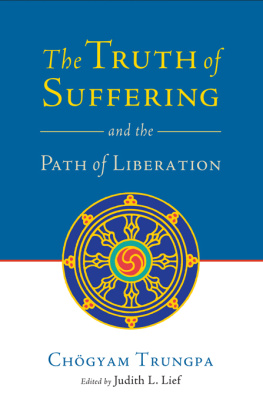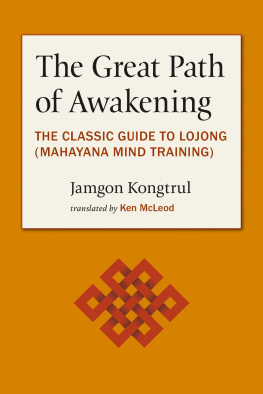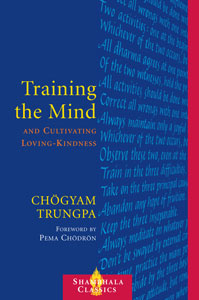ABOUT THE BOOK
Warning: Using this book could be hazardous to your ego! The slogans it contains are designed to awaken the heart and cultivate love and kindness toward others. They are revolutionary in that practicing them fosters abandonment of personal territory in relating to others and in understanding the world as it is.
The fifty-nine provocative slogans presented hereeach with a commentary by the Tibetan meditation master Chgyam Trungpahave been used by Tibetan Buddhists for eight centuries to help meditation students remember and focus on important principles and practices of mind training. They emphasize meeting the ordinary situations of life with intelligence and compassion under all circumstances. Slogans include, Dont be swayed by external circumstances, Be grateful to everyone, and Always maintain only a joyful mind.
This edition contains a new foreword by Pema Chdrn.
CHGYAM TRUNGPA (19401987)meditation master, teacher, and artistfounded Naropa University in Boulder, Colorado, the first Buddhist-inspired university in North America; the Shambhala Training program; and an international association of meditation centers known as Shambhala International. He is the author of numerous books, including Shambhala: The Sacred Path of the Warrior, Cutting Through Spiritual Materialism, and The Myth of Freedom.
Sign up to receive inspirational quotes by Chgyam Trungpa and special offers from Shambhala Publications.

Or visit us online to sign up at shambhala.com/eoceanofdharma.
Training the Mind
& CULTIVATING LOVING-KINDNESS
Chgyam Trungpa
EDITED BY JUDITH L. LIEF

SHAMBHALA Boston & London 2010
SHAMBHALA PUBLICATIONS, INC.
Horticultural Hall
300 Massachusetts Avenue
Boston, Massachusetts 02115
www.shambhala.com
1993 by Diana J. Mukpo
Translation of The Root Text of the Seven Points of Training the Mind 1981, 1986 by Chgyam Trungpa; revised translation 1993 by Diana J. Mukpo and the Nland Translation Committee. Translation of Forty-six Ways in Which a Bodhisattva Fails 1993 by the Nland Translation Committee.
All rights reserved. No part of this book may be reproduced in any form or by any means, electronic or mechanical, including photocopying, recording, or by any information storage and retrieval system, without permission in writing from the publisher.
Library of Congress Cataloging-in-Publication Data
Trungpa, Chgyam, 1939
Training the mind and cultivating loving-kindness/Chgyam Trungpa, edited by Judith L. Lief.
1st ed. p. cm. Includes index
eISBN 978-0-8348-2123-1
ISBN 0-87773-954-4
ISBN 1-59030-051-3
1. Bodhicitta (Buddhism) 2. Self-controlReligious aspectsBuddhism. L. Lief, Judith L. II. Title.
BQ4398.S.178 1993 93-520
294-3 444dc20 CIP
Contents

Foreword

I AM BOTH HONORED AND DELIGHTED to have been asked to write this preface to the new edition of Chgyam Trungpa Rinpoches marvelous book about training the mind in the ways of loving-kindness and compassion.
Since 1981 the fifty-nine slogans that are contained in this book have been the primary focus of both my personal practice and of my teaching. For all these years, I have contemplated Trungpa Rinpoches commentaries on the slogans almost daily, and I can say without exaggerating that they have transformed my life.
The method I have used in this continually deepening exploration is one that Trungpa Rinpoche recommended to his students. Using a set of cards printed with each of the slogans, I shuffle the stack each morning and draw the slogan for the day. Then I read from this book about what Rinpoche has to say, sometimes jotting down notes on the back of the card. This is followed by my best try to live by the meaning of the slogan throughout my day. Sometimes I forget the slogan all day long, only to be reminded of its message when I come back to my room at night. Usually, however, if something challenging arises, the slogan of the day or perhaps a different one altogether will come to mind and provide me with on the spot instruction. This always introduces me to a bigger perspective. I begin to have increasing confidence that I can utilize the slogans to be less reactive and to see things more clearly throughout my whole life. Slogan practice indeed continues to help me transform all circumstances into the path of enlightenment. Even the most difficult of situations have become more and more workable. The more I get hooked by what is going on, the more these challenges become a remarkable teacher, one that can open and soften me and make me wiser.
The key is, however, to acknowledge that I am hooked and to work with the slogan, rather than to continue to get all worked up. We are all experts at escalating our emotional reactivity, fanning the fire with habitual thoughts and predictable strategies. For me, the slogan contemplation interrupts this momentum and brings a fresh take into the dynamic. My gratitude to this practice and to my teacher Chgyam Trungpa Rinpoche is limitless. I feel there is no way I could sufficiently repay his kindness in introducing me to these profound yet simple teachings and encouraging me to practice them. As Rinpoche says in his introduction, You can just follow the book and do as it says, which is extraordinarily powerful and such a relief.
These words certainly resonate with my personal experience, and I am eager that others also give this practice a try. I feel sure that by taking these words to heart many will profit as I have. May you be one of these fortunate ones now and in the future.
Pema Chdrn
Editors Preface

T HIS BOOK IS A TRANSLATION by the Nland Translation Committee of The Root Text of the Seven Points of Training the Mind by Chekawa Yeshe Dorje, with a commentary based on oral teachings presented by Chgyam Trungpa, Rinpoche. In his teaching on this subject, Trungpa Rinpoche utilized as a central reference the commentary by Jamgn Kongtrl the Great, entitled in Tibetan Changchup Shunglam (The Basic Path toward Enlightenment), which was included in the collection of the principal teachings of Tibetan Buddhism that the latter compiled, known as The Five Treasuries. (Trungpa Rinpoches own teacher, Jamgn Kongtrl of Sechen, was an incarnation of this leading nineteenth-century teacher.)
The seven points of mind training are attributed to the great Indian Buddhist teacher Atisha Dipankara Shrijnana, who was born of royal heritage in Bengal in 982 C.E. Thus, the list of mind training slogans compiled by Chekawa is often referred to as the Atisha Slogans. Having renounced palace life as a teenager, Atisha studied and practiced extensively in India and later in Sumatra, with his principal teacher, Dharmakirti (also known as Serlingpa in Tibetan), from whom he received the instructions on bodhichitta and mind training. Upon his return to India, he began to reestablish these once-lost teachings and took a post at Vikramashila, a famous Buddhist monastic university. Invited to bring the teachings on mind training to Tibet, he taught there for about thirteen years, until his death in approximately 1054, having transmitted this body of wisdom to his closest Tibetan disciple, Dromtnpa, the founder of the Kadam lineage of Tibetan Buddhism.
Next page















